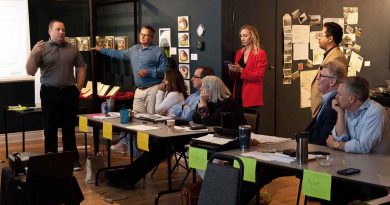Analysis: Library to Open Sundays
By John Swartz
Last Thursday’s Orillia council budget committee meeting had an interesting discussion about the Orillia Public Library’s budget request. There were two particular aspects involving staffing.
The library board, in preparing the budget, took a pragmatic approach to keeping the bottom line number at an acceptable to council level and decided to cancel Sunday operating hours. The text from the submission justifying the board’s decision is:
“In April of 2021 a security audit was conducted that resulted in 24 recommendations. One of those recommendations was to staff Sundays with a full complement. To do that the library would need to request twice the funds that are currently in the budget for Sunday operations, the library board has opted instead to cease Sunday operations until there is funding for adequate staffing on Sundays. The statistics for library usage that day are low and it is hard to justify the cost of three hours of operations for so little usage.”
![]()



![]()
It is important to declare at this point I was a library board member for 13 years, chair of the finance committee for 10 years, vice chair for one term and chair for one term. I was involved with preparing the annual budget request to council, and presented it at budget committee. This informs the perspective and the balance of this analysis.
Low use of the library in the report excerpt above comes from stats showing the Sunday after New Year’s 2020 had only 200 people visit, which is not surprising. Counts were over 300 the next two weeks, and then to 400 the week after college and university students were back to work and about when high school students would have project assignments in hand. It was maybe not the best month to use as an example. The library has an average of 1,000 daily visitors for 8 hours of operation, By extrapolation 375 people on average visit during Sunday’s 3 hour timeframe, and I suspect further investigation of the stats will show that average holds, if not exceeded.
The first reaction to learning the board decided Sunday service was to end was, “does anybody know how many years of trying it took to get council to provide the funding to open Sundays?” Until openings were approved, Orillia had the only library of similar size without Sunday service.
“We felt we were really in between a rock and a hard place in terms of being able to reduce the budget. It was the simplest thing to do,” library CEO, Bessie Sullivan said to SUNonline/Orillia about the board’s decision. “We already had two large requests and to ask for more after that didn’t seem prudent.”
It’s understandable. Unlike the OPP, the Simcoe Muskoka District Health Unit, and the county – all of which are autonomous entities and boards as is the library – they can send in budget requests and there really is not a whole lot council can do about increases. While with the library, everybody is an expert and running a library with less money shouldn’t be too hard. Those sentiments usual come from being less expert about what is necessary and what really is ‘nice to have.’
That said, six current councillors have had seats on the library board at one time or another. We’ll qualify that because councillors have to be Jack’s of all trades and have to digest reams of information each week; they don’t have the luxury of diving into the details of each committee or board they may have a seat on. In reality council seats on boards – with some exceptions – are really a case of having eyes and ears extending into the community and to give advice to those entities on what council may be thinking on a topic.
It’s not a stretch to imagine board members hearing a higher increase in the budget wouldn’t fly would lop off low hanging fruit themselves, rather than council doing it for them (more on this below). This doesn’t take the sting out for those who lobbied and defended making the money available to open Sundays in the first place, but it is reality.
Sullivan was part of the online meeting Thursday to take questions and provide information council wanted to make decisions. One decision was to approve a budget line reduction of $22,872 in wage savings by closing Sundays, and another to increase the budget by $72,847 in order to hire a community outreach worker. What?
Trouble In The Hen House
Some readers may be aware the library has had some issues with visitors who either haven’t learned social graces, or don’t care about them. It comes part and parcel with the general breakdown of norms and governments shirking responsibility for those in need of help.
“I would argue the vast majority (of problems) is based on things like poverty, addiction, mental health issues, illness in general, homelessness. There are also societal issues,” Sullivan said. The Orillia Public Library is not the only one with these issues.
There was a suggestion last year to hire a security guard, or, as was voiced at budget, having the OPP set up a satellite office in the library building (which would require a lot more tax dollars). Both ideas are not workable. Who wants their children greeted by a uniform at the door, scrutinizing why they are there, and while they are there. This is the absolutely the wrong message. We’ve all seen videos of how these guardians of the gates operate at schools and places young people (teens) frequent when the demands of their positions go to their heads. In those instances public safety appears to be the last thing on the minds of many real and pretend badge wearers.
The safety study involved other municipal departments to find solutions to keep staff and visitors safe. Some of it involved more doors and locks and one solution was to increase staffing on Sundays. The library has been open for three hours on Sunday afternoons with a half staff complement. A skeleton staff cannot be aware of all that is happening in all parts of the library all the time. We’ve all kind of relied on people knowing how to act in libraries, which allows lower staff levels on a Sunday afternoon. Investigating what other libraries have done revealed the social worker solution.
So the saving on the wage line for librarians partially offset the increased cost on another line for the social worker. It sounds like good money management – if your purpose is not to be a community’s source of information and learning.
Council Surprises
Surprisingly, a majority of council did not like the idea of closing the library on Sundays. Councillor Ted Emond voiced council’s position best.
“The library in Orillia is an important institution in our downtown. We have invested a huge amount of taxpayer’s money in building a state of the art facility. We invest annually a significant percentage of our operating budget in operating that facility. I know that its primary focus is to serve the people who use the library facility, but the spin off impact of having such a wonderful facility in our downtown core is exceptionally important to the economy of the City of Orillia.”
“As I indicated yesterday, weekends are times when, generally speaking, families have more flexibility and more leisure time to come to our core and the library is a significant reason for them to do that. The fact they are in the core and the fact that many of them take advantage of the other amenities that are available – our restaurants, our retailers who are open on Sundays, creates for the City an economic benefit that I would hope the board of the library considers when it is making its decision with regard to the service level it is providing. I will continue to be a strong advocate of full service on the weekends from our library. If that requires the City of Orillia taxpayers to provide additional funding for that to happen, then that should be considered as part of our overall economic program for our City,” said councillor Emond.
This writer’s ears perked up significantly because some of those same arguments were made time and again over the years and it was rather nice to hear someone else making them. That four more councillors, Lauer, Campbell, Hehn and Mayor Steve Clarke weighed in with the same tack was heartwarming. Councillors Ainsworth, Fallis and Kloostra also made positive comments. Councillor Cipolla did not speak on this issue, but it’s possible he also favoured keeping the library open on Sundays.
What had to happen was for council to reject taking the $22K out of the budget (effectively increasing the library’s total budget request by that amount), add in $19,140 to pay for full staffing on Sundays – and then approve funds to hire the outreach worker; all which they did.
Division of Responsibility
It seemed pretty straight forward getting to those votes, but what coloured the journey was discussion about if the library board would go along with the changes. First, in my experience, no board is going to turn down council when more money is being given. Second, councillors don’t always understand relationships between themselves and other groups as indicated by councillor Emond’s questioning:
“I just want to be sure our request to the library if accompanied by funding is a request the library needs to take into consideration very seriously,’ said Emond, who went on to ask for a report on the limits and responsibilities of council and the library board.
Fundamentally, council understands they approve the money, but they are unclear about if they can direct the board.
Simply stated, all library boards are created under the province’s Library Act. Library boards are separate bodies with absolute responsibility to operate the library and manage the money given by local governments as they see fit. Council’s main role is accepting a budget plan and writing the cheque, and they get to appoint board members. Council has no power to tell a library board what to do.
There is good reason for this, which has not so much to do with the money, but the operation. Strictly speaking, the board can take the money and stay closed on Sundays, but I don’t think the board has dummies sitting at the table. Operationally, more than a decade ago there was an instance with some opinion that a book should not be part of the library collection; the board was firm in rejecting the idea and there was nothing council could do about it. There are other details of operation council cannot meddle in.
![]()



![]()
That said, council does have power with the purse strings at budget time to pave the way or block some moves by the board. The City also owns the building and can dictate a few things – like for example, what exactly some of those 24 safety recommendations are going to be. But it behooves council to listen to library staff on many issues. Several years ago the City tried to save money by having the heating and ventilation shut down overnight, which served – in a building designed to function with a 24 HVAC system operating – to create such high temperatures and humidity levels each morning and well into lunchtime the library and the City risked losing tens, if not hundreds, of thousands of dollars of library holdings.
This raises a question about a comment from the City’s general manager of environment and infrastructure services, Andrew Schell. He informed council he’d need to look at what additional operating costs there would be if council decided to take up councillor Kloostra’s position (“To be open for three hours, you might as well not be open at all.“) the library be open Sunday’s for eight hours instead of three.
“Opening later, we will have to put together some operating costs because obviously there will be heat and hydro and additional costs that will be involved with the opening, so we’ll need some time to deal with that as well,” said Schell.
For a building designed to have the HVAC running 24 hours a day, and we all know a good portion of it is lit up all night (mostly for cleaning staff to be able to work and for security reasons) one wonders what kind of other extra costs amounting to more than a hill of beans there could be.
On this issue, council displayed some wisdom not experienced in the past regarding the library’s Sunday hours. What is not apparent is the positive effect it will have on many young people who rely on the library as an important part of their education. Congratulations council.
(Photos by Swartz – SUNonline/Orillia)




